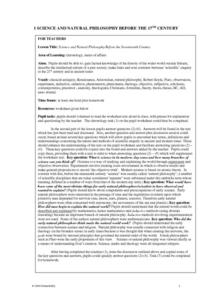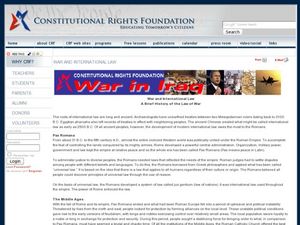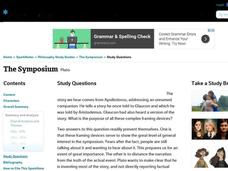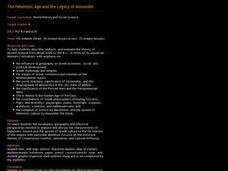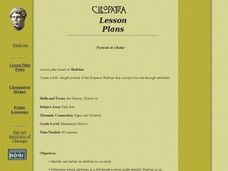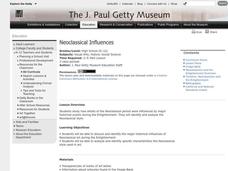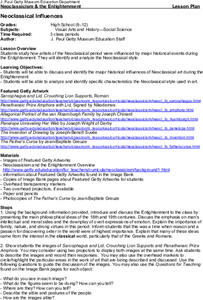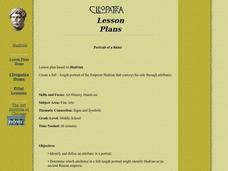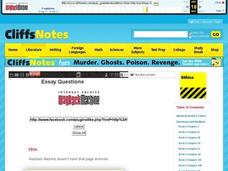Curated OER
Laches
In this online interactive history worksheet, students respond to 10 short answer and essay questions about Plato's Laches. Students may check some of their answers on the interactive worksheet.
Curated OER
Argument in an Athenian Jail: Socrates and the Law
Students read and discuss Socrates's "Crito" and examine the arguments he made supporting his own death penalty. They consider the still-relevant debate between the rights of the individual and the rule of law.
Curated OER
Science and Natural Philosophy Before the Seventeenth Century
Students complete a worksheet about some of the natural philosophers in history. They use graph paper and create a timeline with the dates of birth and names of a list of natural philosophers. They list four questions concerning life and...
Curated OER
Ancient Greece Unit Test
In this World History worksheet, students answer various question types on a test on Ancient Greece. Students select the correct word to fill in blanks, circle letters for the best answer, and complete five essay or short answer...
Curated OER
War and International Law: A Brief History of the Law of War
Learners investigate the history of the law of war. In this international law lesson plan, students listen to a lecture regarding the history of international law spanning from Pax Romana to Collective Security. Learners respond to...
Curated OER
Polykleitan God or Athlete
Students analyze the Polykleitan God depicted in art and create their own ideal form of sculpture. In this sculpture and art lesson, students read about Greek art of the human form. Students analyze the art of Polykleitos and then create...
Curated OER
The Symposium
In this online interactive philosophy instructional activity, students respond to 10 short answer and essay questions about The Symposium by Plato.
Pearson
Lesson Plan: Introduction to Plato’s Cave
Can we perceive reality or are we chained by preconceptions that limit our vision? Plato’s allegory “The Cave” serves to introduce nascent philosophers to Plato’s dialogues and hopefully to engender a love of ideas and discourse. A...
Curated OER
Phiolosophy and Politics
Students study about Aristotle, Plato, and Socrates and how their role affected the Greek culture. They look at a video clip from Bill and Ted's Excellent Adventure and note similarities and differences from the movie and what is in...
Curated OER
The Helenistic Age and the Legacy of Alexander
Eighth graders describe, analyze and evaluate the history of ancient Greece from 2000 to 300 B.C. They explore the influence of geography on Greek economical, social, and political development.
Curated OER
Hadrian The Emperor
Pupils engage in a lesson that is concerned with the historical figure of Hadrian and how he ruled the Roman Empire. They look at images drawn by artists that attempt to capture his character. Students create their own portraits of the...
Curated OER
Parthenon
Ninth graders explore he purposes of the Parthenon. In this World History instructional activity, 9th graders create a complete picture of the Parthenon. Students research one aspect of the structure and report their findings back to...
Curated OER
Children's Philosophy
Using children's books is an excellent way to introduce your students to the world of philosophy.
Curated OER
Flying with Pythagoras
A lengthy narrative about Pythagoras and his students precedes an activity in which your young mathematicians practice using the Pythagorean theorem to solve three problems about flight and distance. Answers are provided.
Curated OER
The Declaration of War Against Japan and Just War Theory
Students examine the attack on Pearl Harbor and how it changed the history of the United States. After watching a video from "The War", they discuss the characteristics of a "just war" and identify the laws in international warfare. ...
Curated OER
Neoclassical Influences
Students analyze neoclassical art. For this art history lesson, students listen to their instructor present a lecture regarding the details of the art produced during the Enlightenment.
Curated OER
Neoclassical Influences
Students identify artists of the Neoclassical period and how they were influenced by major historical events during the Enlightenment as well as identify the Neoclassical style.In this Neoclassical art lesson, students discuss...
American Museum of Natural History
What is Astronomy?
Go study the universe. Pupils learn seven aspects about astronomy and astronomers. They begin to learn about constellations; distance and motion between objects; gravity; the electromagnetic spectrum; dark matter and energy; and teams of...
Curated OER
Tools of Persuasion
Ethos, pathos, and logos. After reading a passage about Aristotle's, three basic tools of persuasion, individuals answer a series of multiple choice comprehension questions and craft responses to three short-answer essay prompts.
Curated OER
Portrait of a Ruler
Students create a full-length portrait of the Emperor Hadrian that conveys his role through attributes and explain how this bust of Hadrian conveys a story about life as an emperor in ancient Rome.
Curated OER
Explore the Mathematics of the Explorers
Columbus and other explorers relied upon mathematical calculations using the Earth, stars, and ships speeds.
Curated OER
Ethics: Study Help and Essay Questions
In this philosophy worksheet, students respond to 21 short answer questions about Aristotle's Ethics. Students may also take the 13 question online interactive quiz on the selection.
Curated OER
Ethics - Essay Questions
In this literature worksheet, students respond to 21 short answer and essay questions about Aristotle's Ethics. Students may also link to an online interactive quiz on the novel at the bottom of the page.
National Institute of Open Schooling
Atomic Structure
Learners explain historical findings such as Rutherford and Bohr's contributions, explain wave particle duality, and formulate Heinsenberg's uncertainty principle. They also draw s, p, and d orbitals, explain more historical findings,...




